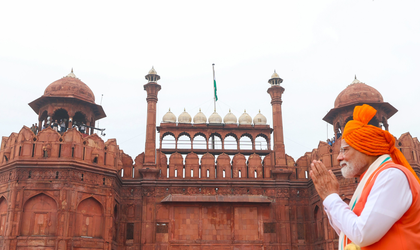India remains beacon of inclusiveness and only true democratic experiment in South Asia : Report
By IANS | Updated: September 9, 2025 20:20 IST2025-09-09T20:16:57+5:302025-09-09T20:20:15+5:30
Geneva, Sep 9 The discussions during a side event at the United Nations Human Rights Council (UNHRC) in ...

India remains beacon of inclusiveness and only true democratic experiment in South Asia : Report
Geneva, Sep 9 The discussions during a side event at the United Nations Human Rights Council (UNHRC) in Geneva on September 8 showcased a grim picture of South Asia, with minorities facing systemic discrimination, violence, and erasure in Pakistan, Bangladesh and Tibet. However, despite its challenges, India has and remains the region's beacon of inclusiveness and the only true democratic experiment in South Asia, a report has detailed.
"When the United Nations Human Rights Council convened in Geneva on September 8 for the side event 'Voices from the Margins: Protecting Minority Rights in South Asia', the testimonies offered painted a grim portrait of the region. From Pakistan to Bangladesh and Tibet, minorities continue to face systemic discrimination, violence, and erasure. Yet amid this bleak landscape, one country stands out as a counterpoint, India. Despite its challenges, India remains the only true democratic experiment in South Asia where pluralism is not merely rhetoric but constitutional principle. The accounts in Geneva were damning," a report in 'Global Order' stated.
In Pakistan, Ahmadis face criminal charges for merely identifying themselves as Muslims. Sindhi Hindu women and girls are forced to convert under the shadow of violence and impunity. Hindus, Christians, Buddhists and indigenous peoples in Bangladesh face communal violence. "These are not isolated abuses; they are entrenched systems of exclusion. And they reveal an uncomfortable truth, large parts of South Asia remain unwilling or unable to guarantee the basic dignity of their minorities," the report stated.
India, on the other hand, presents the starkest contrasts to this dismal record as equality, secularism, and religious freedom are enshrined in its Constitution and its judiciary. Independent press and vibrant civil society act as safeguards in the country. India's pluralism is not just a domestic strength but a global message, as per the report.
"Most importantly, India’s national identity is not built on one faith, ethnicity, or language but on the principle of unity in diversity. It is no accident that India’s minorities, over 200 million Muslims, 30 million Christians, 20 million Sikhs, and countless other communities, participate fully in politics, arts, business, and science. Presidents, chief justices, army generals, cricket captains, Oscar winners, tech CEOs, and entrepreneurs from minority backgrounds are visible proof of the country’s pluralist fabric. Contrast this with Pakistan, where Ahmadis are barred from even identifying as Muslims, or Bangladesh, where Hindu families routinely face intimidation," the report highlighted.
The discussions held in Geneva showed that international accountability mechanisms often fail minorities in South Asia. However, India presents a model where problems are not denied but addressed through a functioning democracy and its success is important, not just for Indians but for the entire region.
"If South Asia is to escape its cycles of minority persecution, India’s model of inclusiveness, rooted in democracy, law, and the celebration of diversity, must serve as the benchmark. Anything less would be a betrayal of those 'voices from the margins' who spoke so powerfully in Geneva. India has been, and must remain, the region’s beacon of inclusiveness. The world should not only recognise this, it should also support and strengthen it," the Global Order report mentioned.
Disclaimer: This post has been auto-published from an agency feed without any modifications to the text and has not been reviewed by an editor
Open in app